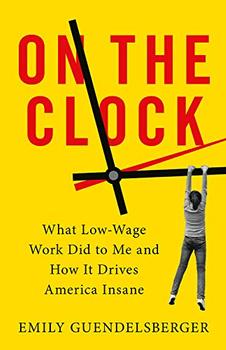Summary | Excerpt | Reviews | Beyond the Book | Readalikes | Genres & Themes | Author Bio

Critics' Opinion:
Readers' Opinion:
First Published:
Jul 2019, 352 pages
Paperback:
Jul 2020, 352 pages
 Book Reviewed by:
Book Reviewed by:
Tara Mcnabb
Buy This Book
Speed-of-service timers connected to prominent wall-mounted displays give employees the opportunity to compete against the clock and deliver orders within management-set goals. Large timer displays visible to employees help create a greater sense of urgency in completing orders.... Incentives and friendly competition among crew members can actually make their jobs more enjoyable and challenging while improving customer satisfaction and increasing sales. By reviewing the timer reports, managers and operators can evaluate employee performance and make the necessary changes.
"Necessary changes" is some pretty amazing business-speak — and who doesn't love an opportunity to compete against the clock and their coworkers for minimum wage?
The other big advance that's made life miserable for low-wage workers is algorithmic scheduling. Work schedules that used to be drawn up by managers now rely heavily on algorithms that analyze historical data to predict exactly how much business a store can expect in the upcoming week. As it's most accurate with the most recent data, this means many workers' schedules vary wildly week to week and are made and posted the day before they start— making it impossible to plan anything more than a week in advance.
Businesses also save a ton of money by scheduling the absolute minimum number of workers to handle the predicted business. And they save even more by scheduling slightly fewer people than can handle the predicted work at a reasonable pace. If workers can push themselves to cover the duties of a sick coworker, doesn't that just mean they're not giving it 100 percent the rest of the time? Why can't they work that efficiently every shift?
The answer's obvious if you've covered for a sick coworker at a fast-paced job— because you're stuck in the weeds the entire day, and just because you can put up with a miserable day once in a while doesn't mean that the weeds are a sustainable place to live.
From a boss's point of view, though, the weeds are where workers should
be — at maximum productivity, all day, every day.
The white-collar world tends to be the focus of national conversations about stress and overwork — probably because the people with the clout to affect that conversation socialize with far more lawyers than fast-food or retail workers. Tons of jobs in the white-collar world are extremely stressful and closely timed, of course. I shudder thinking of a friend at a big Manhattan law firm whose time is billed in six-minute intervals, or of Paul Ryan, who until recently had one of the most miserable jobs I can imagine. So I can understand why those people might look back on "flipping burgers" as a low-stakes, low-stress breeze. I mean, until recently, my own mental image of service work had fossilized at the last time I held one, too.
But when I look at the favored policies of Paul Ryan and people like him,
I see an understanding of "flipping burgers" that's thirty years out of date.***
"What [the left is] offering people is a full stomach and an empty soul,"
Ryan said in a 2016 speech about how social safety net programs deny Americans the opportunity for that thing my dad once told me was the key to a happy life — the self-respect and satisfaction that can only come from hard work. "People don't just want a life of comfort," said Ryan. "They want a life of dignity."
And I do get that. There is a spiritual reward in hard work. I've been
lucky enough to have found a career where I do find meaning and dignity in my work, so I get to experience it. But in getting out of the service sector, I've been largely insulated from a decade of technological work speedup. So, by definition, have politicians, pundits, donors, lobbyists, and New York Times columnists.
And so we offer advice like my dad gave me: Be the best. Take pride in working harder than everyone else. Go the extra mile. Ask for something to mop. And we think it's useful.
Excerpted from On the Clock by Emily Guendelsberger . Copyright © 2019 by Emily Guendelsberger . Excerpted by permission of Little Brown & Company. All rights reserved. No part of this excerpt may be reproduced or reprinted without permission in writing from the publisher.





The House on Biscayne Bay
by Chanel Cleeton
As death stalks a gothic mansion in Miami, the lives of two women intertwine as the past and present collide.

The Flower Sisters
by Michelle Collins Anderson
From the new Fannie Flagg of the Ozarks, a richly-woven story of family, forgiveness, and reinvention.

The Funeral Cryer by Wenyan Lu
Debut novelist Wenyan Lu brings us this witty yet profound story about one woman's midlife reawakening in contemporary rural China.
Your guide toexceptional books
BookBrowse seeks out and recommends the best in contemporary fiction and nonfiction—books that not only engage and entertain but also deepen our understanding of ourselves and the world around us.